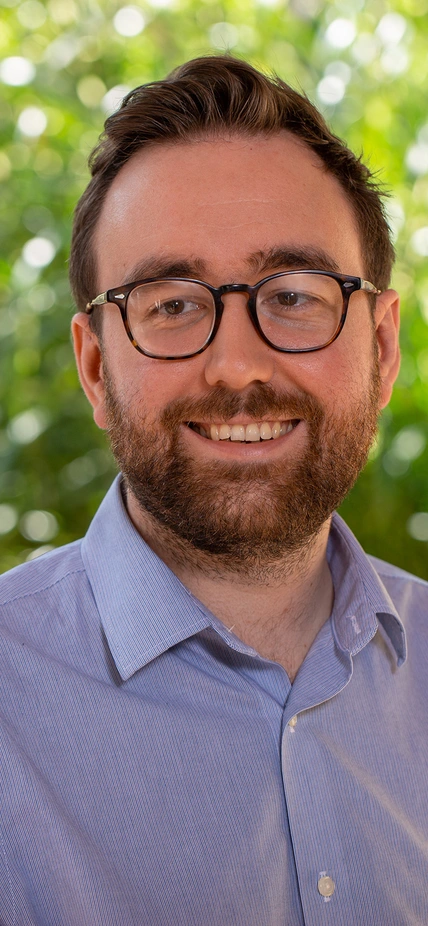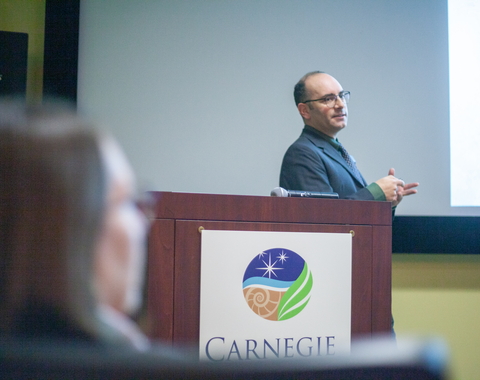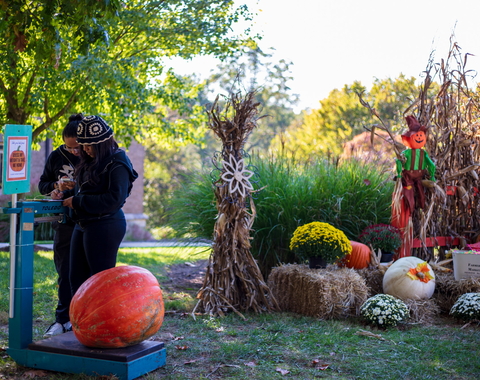Samuel (Sam) Dunning is a metal-organic framework (MOF) chemist who comes to us from the University of Texas Austin. At EPL, Dunning is working with Staff Scientist, Tim Strobel to synthesize carbon nanothreads from small molecule compounds, with the specific aim of incorporating new functionalities and atoms into the threads at high pressure. His work will specifically focus on using molecular and non-molecular precursors for the high-pressure synthesis of extended solids.
What is your area of research and why is it important?
My research can be broadly categorized as materials science, with a focus on materials discovery. My Ph.D. research centered on the discovery of a new family of porous crystalline polymers called phosphine coordination materials (PCMs) which are a unique subset of metal-organic frameworks (MOFs). This research allowed me to work with materials that have a wide range of applications, from luminescent sensors to catalytically active materials.
At Carnegie, I’m excited to be joining the Strobel group to work on the high-pressure synthesis of crystalline nanothreads! Nanothreads are a relatively new class of carbon-based materials with a number of potential properties and applications.
What are the larger implications of your work?
Both the materials and polymerization techniques used in materials discovery work have a number of potentially important implications. For example, high-pressure solid-state polymerization is potentially a far more environmentally friendly technique as it would remove the need for more conventional organic solvents and heavy metal catalysts.
Additionally, the nanothread materials this polymerization technique produces have exceptional strength and stiffness, and the potential to incorporate additional atoms into the thread through careful monomer selection (e.g. using pyridine vs benzene) or using functionalized precursors (e.g. benzoic acid, aniline, chlorobenzene) means these materials should be able to be further customized for specific applications. I’m very excited to see what we can discover!
What inspired you to choose this field of study?
I think in some ways materials discovery chose me! While I was an undergraduate, I had the chance to carry out some fundamental discovery research trying to find new metal-organic framework materials and I’ve loved discovering and characterizing new materials ever since.
The part that really got me hooked is the idea that if you’re lucky you can end up discovering a material that no-one else has ever seen before. You’re the first person in history to ever see this material, how cool is that? I get a lot of excitement out of characterizing these materials, finding out what their structures are, what they’re capable of and how they behave under certain conditions. Sometimes the process can be frustrating but the thrill of discovery makes it worthwhile.
How has your background influenced your research?
Outside of having an extremely supportive family (which I think is essential for any scientist so that they don’t go crazy), as part of my undergraduate studies I had the opportunity to come study in the U.S. This experience was really fundamental in me even thinking about carrying out research as a career path. It was the first time I had ever had the opportunity to carry out research of any form, and it really pushed me towards continuing research by applying to grad school. Because of the great experience I had, I’ve really tried to encourage undergraduates to get involved in research, and even helped establish a new study abroad program during my time in graduate school. I’m happy to say some of the undergraduates I’ve worked with are currently working towards their own PhDs, so the cycle continues!
What else has influenced your thinking as a scientist?
Playing music has always been a big part of my life, and I think in some ways that the creative side has really helped me as a scientist. I think a lot of the time scientists get stereotyped as quite rigid thinkers but in reality, it’s the opposite. After all, most research is founded on the back of looking at what’s already been done and thinking “That’s interesting, but I wonder what would happen if we did this instead?” Sometimes things work out, but also sometimes you hit a scientific roadblock and that’s when I think it really helps to have a creative flair.
When you’re not actively researching, what hobbies or activities do you enjoy in your spare time?
Before COVID shut everything down, my wife and I were getting pretty good at indoor rock climbing, though I think all that good work may have been undone by the time everything gets back to normal! During COVID we’ve been using the extra time to catch up on classic movies. Not being from America there were a few American staples I had never got around to watching, I only saw It’s A Wonderful Life for the first time last year!
Other than that, I play guitar, I like to cook, I like to read (or maybe I should say collect books that I plan to read) and I’m a big sports fan though I’m much better at watching than I am at playing.
If you could meet one of your science heroes, who would it be?
Although my research doesn’t have anything to do with space I’ve always been fascinated by space travel. Well, when I was on a trip to San Francisco with my wife I spent an entire tour of Alcatraz looking at a man with a moustache and telling my wife “I think that’s Chris Hadfield”. On the off chance, it wasn’t him I never plucked up the courage to go and say hello. Lo and behold when I check Twitter later on I see that Chris Hadfield had posted a picture of Alcatraz, so I would definitely say Chris Hadfield to make up for the last time I had a chance to meet him! I’d love to meet Buzz Aldrin as well, how often do you get the chance to talk to someone who has stepped foot on the moon?
Why did you choose Carnegie’s Earth and Planets Laboratory?
Well, firstly I’d like to thank the Earth and Planets Laboratory and Tim Strobel for giving me the opportunity to carry out research at the EPL! The facilities and research at the EPL are fantastic, and the materials discovery work being carried out at the EPL really caught my eye. I don’t have a lot of experience with high-pressure synthesis, and the idea that you could use such extreme pressures to squish molecules to the point where you force bonds to break and form was so fascinating to me. Add into that the fact that these materials were recoverable AND that they’re ordered? The work sounded like such a fantastic opportunity to learn and gain new skills, and I was thrilled to be given the opportunity!
Do you have any advice for current graduate students?
I think the most important thing I could say to current graduate students is to take care of yourself! Make sure you have a healthy work-life balance.
While you’re in graduate school it can feel all-consuming and like there’s all this pressure to get results immediately. But I think a lot of the time that stress is self-imposed. Obviously, it’s good to be motivated to get results, but don’t let it get out of hand! Sometimes it’s better to leave an experiment for tomorrow or put the papers down for the night and make sure you take care of yourself and your family. A lot of the time you’ll end up accomplishing more and getting those results you’re looking for if you’re well-rested and focused anyway!
The second thing I’d say is to try your best to enjoy it and make the most of the people around you. During my time in graduate school, my research group became like a second family to me. Sometimes the chemistry will work; sometimes, it won’t. That’s just the nature of things but when it doesn’t, it helps to have a supportive group of people around you.
Anything else you’d like to add? Include any links you want to share!
For anyone interested, my Google Scholar page can be found here, and my personal website can be found at www.sgdunning.com.



